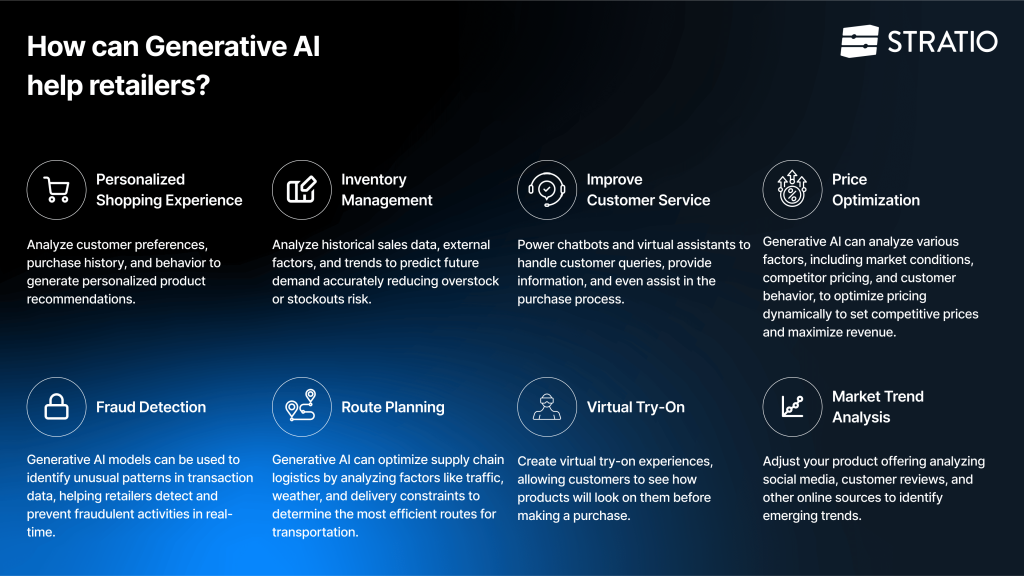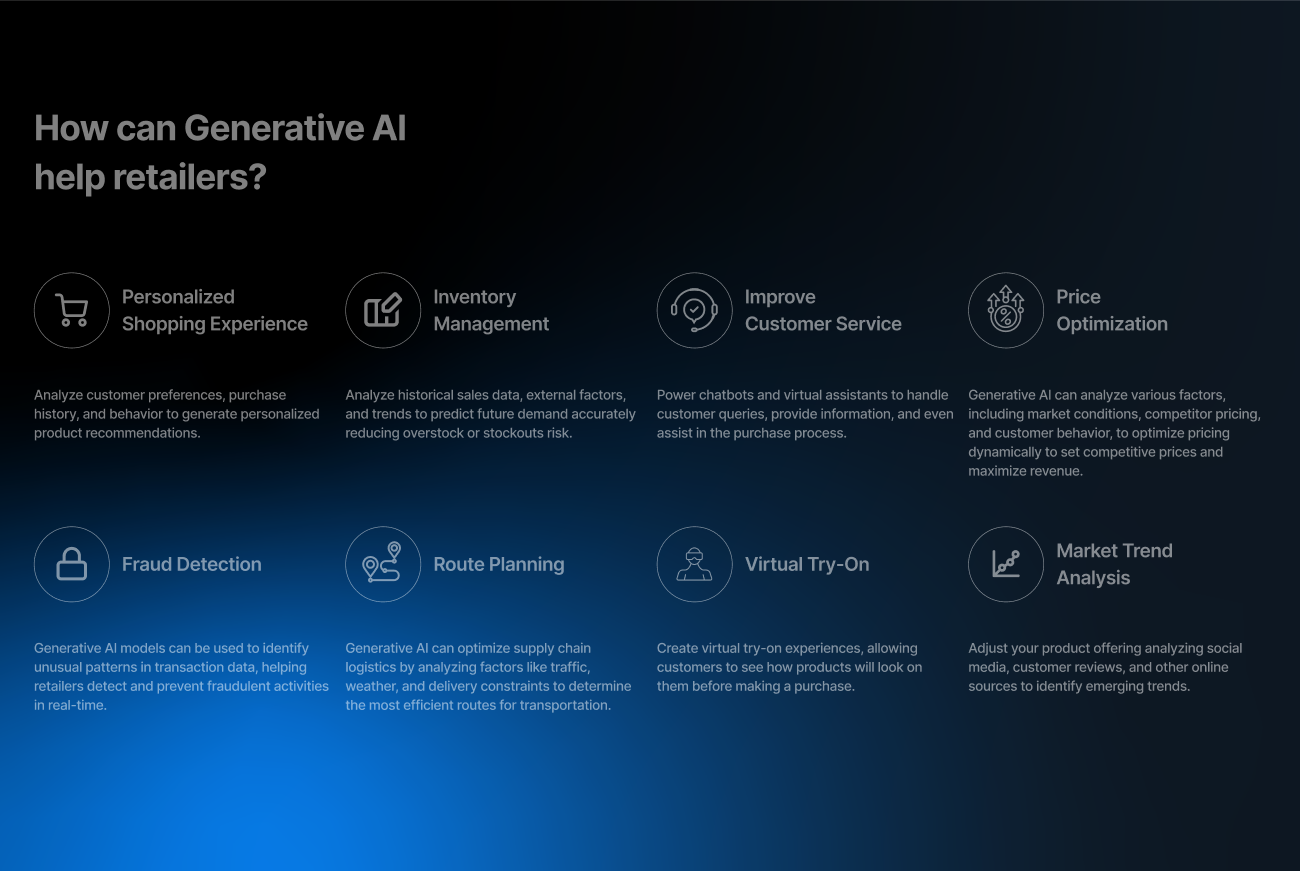Introduction
In the highly competitive retail industry, data is, once again, queen. Decisions are made quicker, options are too diverse, loyalty is at the all time low.
Retailers are under pressure and they need support from technology to stay ahead. .
Technology empowers retailers to ensure that they can anticipate and respond to the needs of consumers, capture new business, and make better choices about what to invest in.
Naturally, achieving all of the above objectives depends on data. Without high-quality data to back up their choices, retailers will be unable to make accurate decisions on where to invest and how to best allocate their staff and resources, while also being unable to adapt their businesses in the face of changing trends.
Great news is that the latest advances in artificial intelligence (AI) and machine learning are now making it easier than ever for retailers to analyze the vast stores of often-siloed datasets.
There is plenty of evidence to support the thesis that retailers are now adopting AI solutions en masse to drive decision-making. According to a recent report by the global market intelligence firm IDC, by 2025, 20% of the top 100 multinational retailers will drive holistic business results using distributed AI systems with integrated data across retail planning, decisions, operations, and optimization.
So, with this in mind, what kind of benefits can real-time data updates provide, and how can retailers use the technology that best provides them?
Siloed data
All retailers possess a wealth of business data, such as:
- Customer purchasing behavior and order history
- Customer demographic information
- Inventory records
- Product data
- Business finances
- Employee information
This data is valuable, but it hasn’t always been used by companies in the best way. For instance, a large volume of this data is siloed: stored in multiple applications and distributed across the entire enterprise (web, mobile, in-store, in various clouds and databases etc.).
As companies grow, they tend to accumulate more siloed data. Subsequently, as their data sets become more extensive and inaccessible, data analysis teams struggle to establish connections and glean valuable insights from their fragmented digital landscape.
However, data fabric products are now giving retailers the ability to automatically unite these disparate data sets together and view them in a single platform. This, in turn, can aid the retailers in opening new channels of communication within the business and help them draw new conclusions based on the data they can access.
New customer expectations
Customers now have newfound expectations when interacting with retailers and expect them to meet their demands. The rise of ecommerce has meant that physical stores are now transforming themselves into more immersive experiences, since so much shopping is now conducted online.
There have even been some blurred lines between the digital and physical. Many customer journeys begin in the online space and migrate to brick-and-mortar stores later on, or vice versa. Because of this, customers now expect to effortlessly be able to move between these data touchpoints — starting a task on one channel and finishing their interaction on another.
Furthermore, customers interacting with retailers now expect a more personalized experience, whether they’re shopping online or in traditional brick-and-mortar stores. They want retailers to use the data they have access to to improve their shopping experience and cater it to their individual needs. Thus, sales are becoming increasingly targeted based on the purchasing behavior of consumers.
What can retailers do?
By using data fabric to unify these disparate datasets, retailers can now have a complete 360-degree view of these customers across all points of contact and monitor them. In doing so, retailers can respond to their customers’ wants and needs and provide a more personalized shopping experience as well as with self-service options:.
Generative AI’s Natural Language Processing (NLP) capabilities enable companies to create customer-facing virtual assistants (VAs) , empowering customers to safely interact with enterprise data safely, give instant responses to their queries, or perform self-service tasks automatically on the customer’s behalf (such as processing customer returns).
Such Gen AI-powered virtual assistants, backed by data fabric with its relevant industry ontologies and business metadata, do not limit feedback to basic/pre-prepared answers. Instead, these live chat interfaces can provide hyper-personalized responses to customer queries. This will, in turn, improve customer experience, loyalty, and satisfaction, which will guarantee long-term sales and more revenue in future.

Operational benefits
High-quality data can give businesses a better view of the internal workings of their company, as well as increase operational efficiency and reduce costs. Meanwhile, automating data aggregation can reduce repetitive tasks, allowing employees to focus on more important tasks that add more value to the company.
By analyzing and assessing the moment-to-moment operations of all organizational stakeholders and employees, enterprises can determine how efficient their workforce is on a day-to-day basis and any issues that might appear in their supply chain, distribution, or sales process.
Real-time data also helps retailers more accurately assess consumers for specific products or services and adjust their sales model accordingly — such as for special offers, discounts, expedited shipping costs for fast delivery, etc. It also means that retailers can quickly anticipate any potential issues that might disrupt full production cycles and respond accordingly.


The power of Stratio Generative AI data fabric
If your enterprise wants to access easily-comprehensible real-time data updates, and get the most out of your untapped datasets, then a data fabric architecture is the best method out there. Using generative AI to support the data fabric can help business users and data analysis teams pull out the insights needed to get an edge on the competitors in the retail industry. And do it much quicker than humans can.
Stratio is a market leader in the data management space with proven experience helping retailers get more from their data. Our end-to-end Generative AI Data Fabric product was the first of its kind in the world to fully automate data access, governance, and security, at an enterprise level and at scale.
So, if you’re interested in getting started, you can request a demo here.




